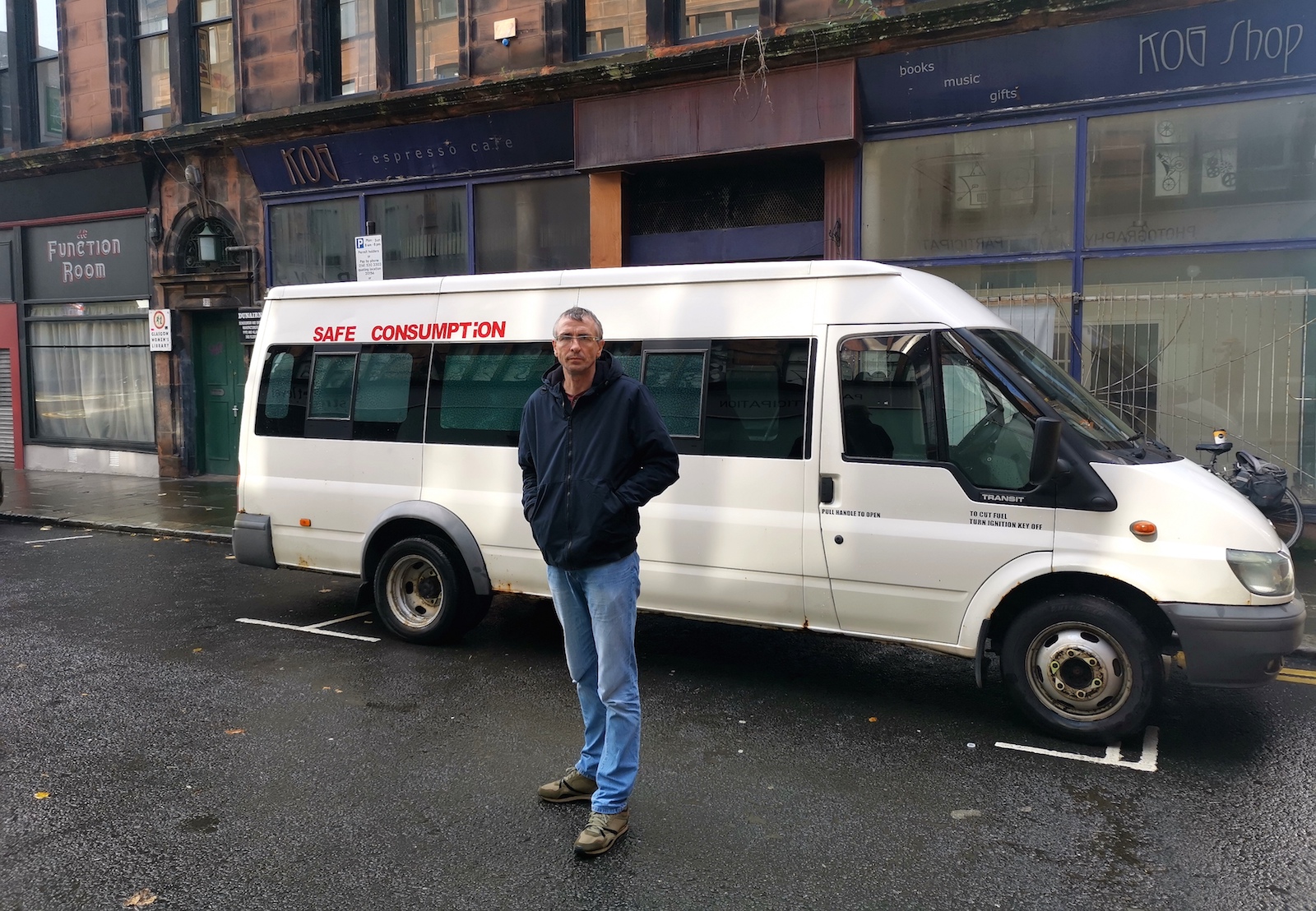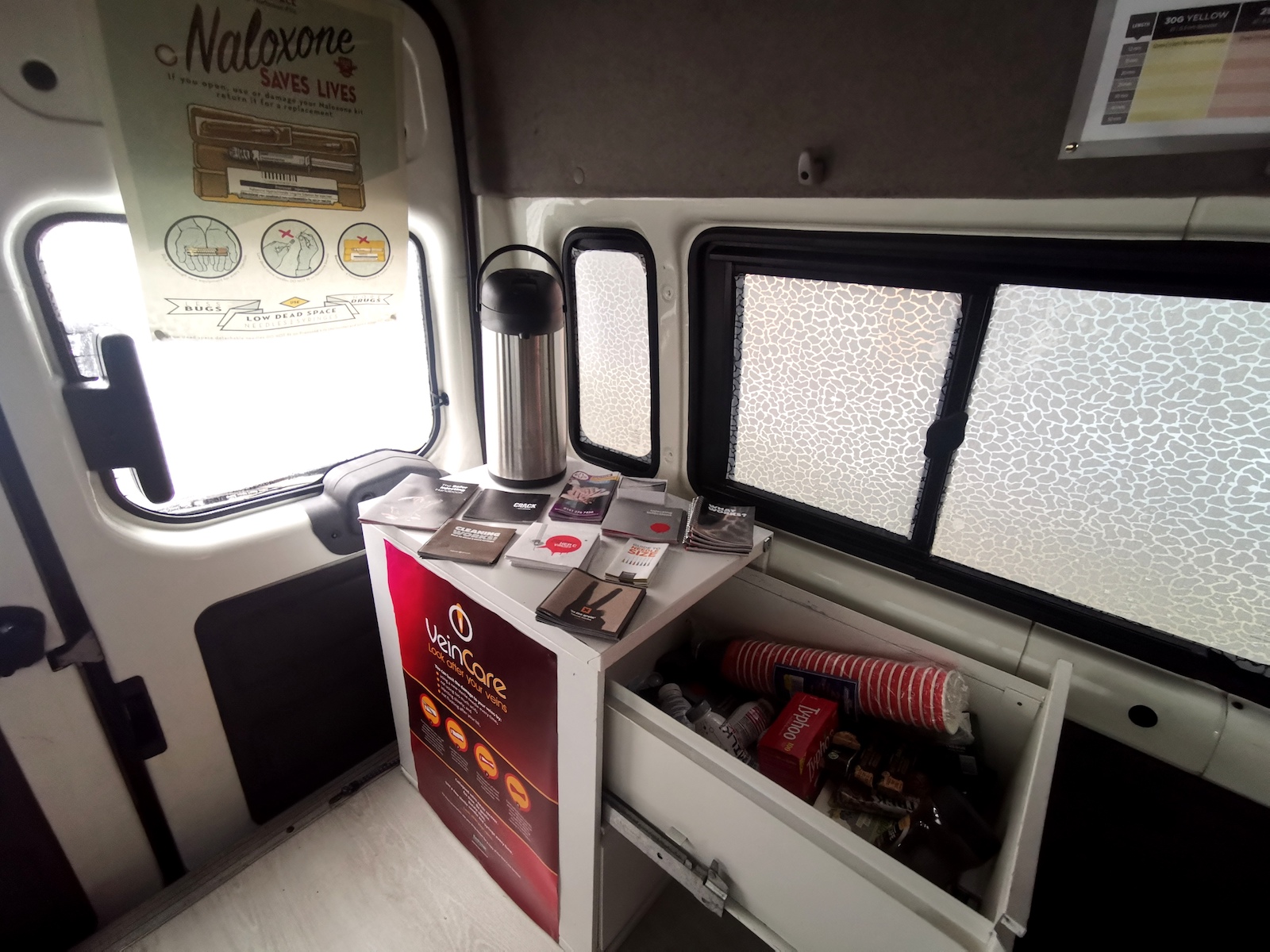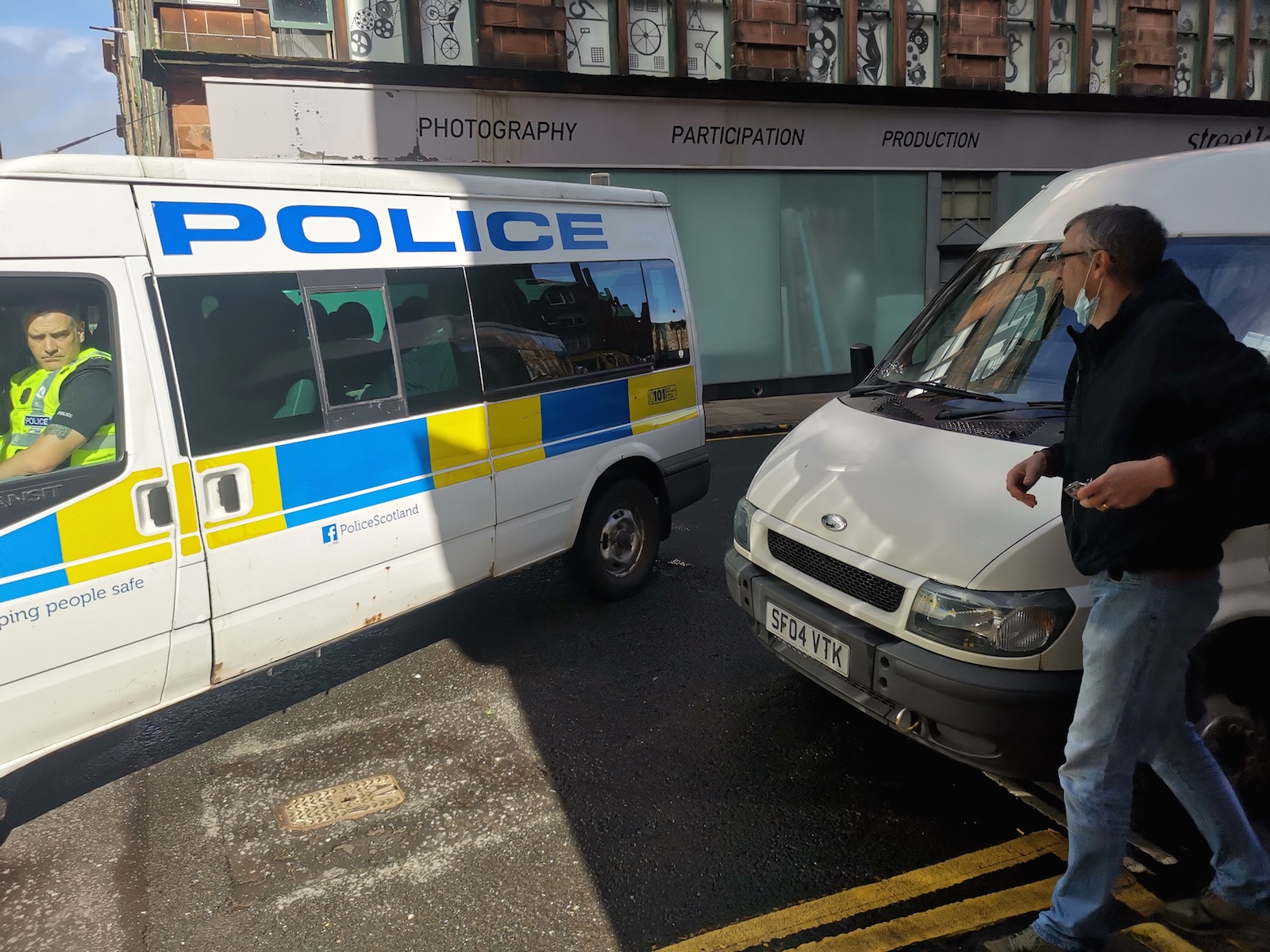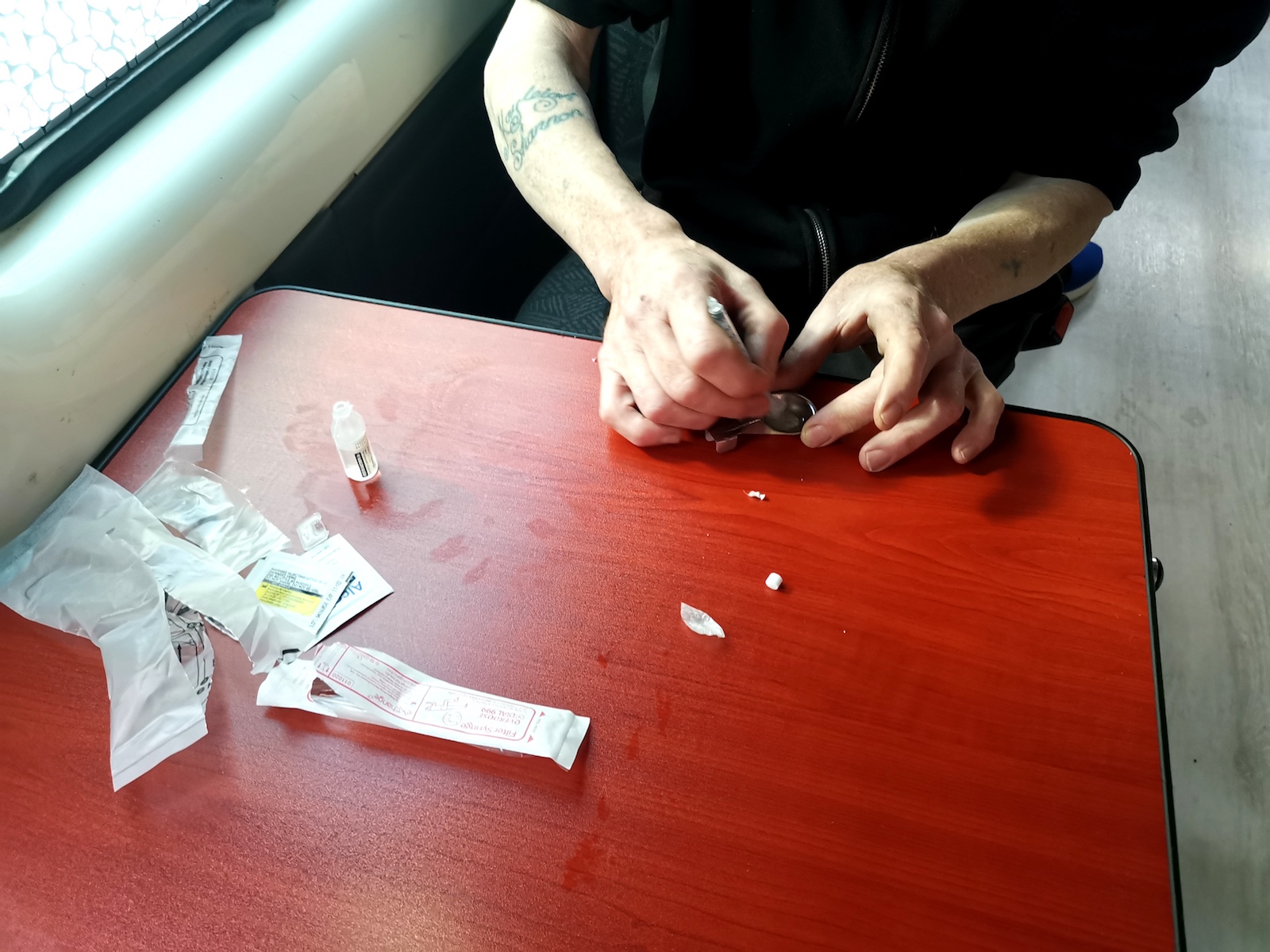“Sorry, I'm not used to people being nice to me like this,” says Gordon, both bemused and touched by his invite into Glasgow’s safer drug consumption van. “I’m never usually with anyone, I just inject myself.”
He pulls down one side of his tracksuit bottoms and pushes a clean needle into his groin, plunging £20 worth of liquid cocaine into his bloodstream. As the drug-dependent father-of-two pulls up his waistband, he tells of being violently abused as a child by his mother, adding that his life spiralled out of control after he had cancer and his ex-wife cheated on him.
Over the course of five hours, another eight people come to the mobile facility to use drugs under professional supervision, with new, sterile equipment. It is the first time the van – which opened a fortnight ago – has hosted the illegal activity it was founded to host.

Peter Krykant, the activist behind the van, was drug dependent and homeless for years. It is his intention to provide as safe a venue as possible for the city’s drug users, instead of leaving them to inject with dirty needles in squalid alleyways where they could find themselves overdosing alone. He sits watchfully with a supply of the overdose antidote naloxone, gently advising some that smoking drugs is safer than intravenous use.
The drug-related death toll in Scotland rose 27 percent in 2018, reaching a record high of 1,187. With that death rate now the highest in Europe, Scotland’s largest city is at the epicentre of the nation’s worsening drug death crisis, as well as Britain's worst HIV epidemic for over 30 years, due to needle sharing.
Poverty, cuts to drug treatment budgets, suboptimal opioid substitute therapy dosing, rising polydrug use and an ageing cohort of drug users have been cited as reasons for the death rate. But compared to Denmark, Switzerland, Portugal and elsewhere on the continent, the UK’s harm reduction policies are vastly out of date – and critics believe this may be a key contributor to the deaths.
There are around 100 officially sanctioned drug consumption rooms across the world, and there has never been a recorded overdose death in any of them, due to thousands of life-saving interventions. Visitors are also variously offered new clothes, haircuts and health and social support.

Plans have long been afoot for a Glasgow drug consumption room (DCR), with council and NHS officials identifying a site in 2017 to house the facility. However, the UK government refused to sanction the move, citing fears about the implied acceptance of wider criminality, and rehashing war on drugs dogma.
Earlier this month, Commons leader Jacob Rees-Mogg claimed DCRs were not in the “best interests of society”. Last Thursday, deputy whip Stuart Andrew acknowledged it was “a very difficult area that we need to be very careful with”, following questions by Scottish National Party MP Alison Thewliss.
“We have a public health emergency on our hands, and it is abundantly clear that UK drugs law is not working for Scotland,” Thewliss told VICE News in a statement, adding that the SNP advocates decriminalising drug use. “Peter Krykant has been brave to put himself at risk, but it should never have come to this. The SNP is committed to introducing legal and regulated supervised drug consumption facilities here in Scotland.”
Back at the van – after Glasgow SNP MP Ronnie Cowan has come to show his support – we have five new visitors, one of whom is in a wheelchair, due to the damage done to his body via heroin injection.
“We need safe places,” says Andrew, who has been addicted to drugs since 1997, and recently came out of prison for theft, as he prepares cocaine for injection. “I’d be in an alley if I wasn’t here right now, but it’s against the law to allow somebody to hit drugs up, isn’t it.”
Perhaps not. The 1971 Misuse of Drugs Act states that an offence is committed if the manager of a premises produces a drug or supplies a drug to somebody, or helps them prepare it. The visitors to Krykant’s van all come with their own miniscule bags of powder, and prepare it for consumption themselves.
After injecting, Andrew accepts an offer of a strawberry protein shake and returns to his wheelchair. He and his friend Scott begin to discuss the death last week of a 17-year-old girl, who had a fatal overdose of heroin in the area. “That’s an SOS van, that is, lads,” says Scott of Krykant’s mobile safer consumption premises.

The police, who drive past periodically throughout the day, don’t intervene to prevent the van from being used to consume drugs. “It’s very political,” an officer says to Krykant as he prepares to go home. “When are you going to be here next?”
Krykant, who lost his job as an outreach worker for establishing the van, tells VICE News it represents a “political statement of intent”. He plans to continue crowdfunding and using his own money to open multiple safer drug consumption spaces in gazebos across the needle-strewn backstreets of Glasgow. Council figures show these streets have become more littered with injecting rigs in recent years, after the 2017 closure of Scotland's busiest needle exchange at the nearby central train station.
“It’s been an absolutely fantastic day,” adds Krykant. “There’s now less discarded equipment used by people on the street, where they’re more prone to blood-borne viruses. Everybody used their own equipment. They all used hand sanitisers. All I'm doing is trying to help save lives – you've got to take a chance sometimes.”
Despite calls to test the boundaries of the law, Scotland’s top legal officer has resisted officially sanctioning change without a specific legal framework. Drug policy powers reside in Westminster, he said, and an official green light for a safer drug consumption facility would risk putting clients, NHS staff and governance bodies in legal jeopardy.
Meanwhile, assistant chief constable Gary Ritchie told VICE News that Police Scotland is committed to improving the safety and wellbeing of people who are drug dependent, but says the establishment of any form of safe consumption location “contravenes” law.
Last year, however, assistant chief constable Steve Johnson branded the Misuse of Drugs Act a relic ripe for reform, saying: “We have to be the generation that says, ‘No, we can learn, it’s working somewhere else.’ If a person enters [safer drug consumption facilities], accesses mainstream services and starts to address those underlying issues, that has got to be good for us.”

The Home Office, which has been under pressure from an influential cross-party group of Scottish MPs, tells VICE News it has no plans to introduce drug consumption rooms or decriminalise drugs, and that visitors to any drug consumption room would be committing the offence of being in possession of an illegal drug.
"Our approach on drugs is clear - we must prevent drug use in our communities, support people through treatment and recovery, and tackle the supply of illegal drugs," a spokesperson said.
However, Steve Rolles, senior policy analyst at Transform Drug Policy Foundation, says overdose prevention sites have been recommended by the government's own expert advisory committee, royal colleges of medicine, and parliamentary select committees.
“The evidence from such services across the world is overwhelming," he says. "Its unsurprising there have been pleas to allow them from police, local councils and devolved government – but all met with indifference from a government clearly more concerned about appearing tough on drugs than saving lives.”
Names of service users were changed to protect identities.
from VICE US https://ift.tt/33p54oh
via cheap web hosting
No comments:
Post a Comment